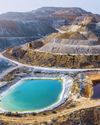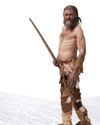CATEGORIES
Categories

A 12-Year-Old Girl's Election Sticker Is a Winner
VOTING IS A FUNDAMENTAL FREEDOM FOR AMERICANS, A MEANS OF DOING ONE'S CIVIC DUTY AND A WAY AN INDIVIDUAL CAN EXPRESS THEIR VOICE. In 1971, the United States lowered its voting age to 18. But that doesn't mean kids and teens under 18 can't participate in elections in various ways.

If everything the human brain does is basically sets of electrical impulses, how exactly does that translate into a state of mind?
You're not the only one asking this question. Every neuroscientist in the world is wondering the exact same thing, says Zach Mainen

EARTH'S TINIEST BUILDERS
THE HIDDEN WORLD OF MICROBES IN THE EARTH'S CRUST

MUMMIES SPEAK
ABOUT MICROBES, MIGRATION, AND MORE

GOING WITH YOUR GUT
HOW DO MICROBES AFFECT OUR HEALTH? LET'S COUNT THE WAYS...

BUG Detective
A burglar sneaks into a house on a quiet street in New York City. He walks through the house, touching countertops and door handles. Finally, he steals a single card from a full deck. Then he leaves.

Little Creatures Among Us THE MANY MICROBES IN OUR DAILY LIVES
When you think you're alone, you're actually not. In the ground, the air, your room, and even your body are Strillions and trillions of creatures so tiny you can't see them.

A Mars Rock Found With Leopard Spots Could Be a Sign of Ancient Life
IN JULY, NASA'S PERSEVERANCE ROVER CAME ACROSS A SPOTTED ROCK IN WHAT WAS ONCE A RIVERBED IN THE JEZERO CRATER ON MARS.

Para Athlete Uses Exoskeleton Suit to Carry the Olympic Torch
In July, a 36-year-old French tennis para athlete, Kevin Piette, got a chance to participate in this summer’s Olympic torch relay without using a wheelchair.

Ancient Egyptians May Have Used a Water System to Lift Stones to Build Pyramid
HOW ANCIENT EGYPTIANS BUILT THE MASSIVE PYRAMIDS IN EGYPT MORE THAN 4,000 YEARS AGO HAS LONG BEEN A TOPIC OF WONDER AND DEBATE.

Seals Can Make Big Dives Thanks to Their Big Hearts
SEALS AND SEA LIONS, WHICH ARE SEMI-AQUATIC MAMMALS, CAN HOLD THEIR BREATHS UNDERWATER FOR ESPECIALLY LONG PERIODS OF TIME.

THE BIG-CITY LIFE OF STEVEN J.BIKE SHOP RABBIT IN BROOKLYN, NEW YORK
Bicycle Roots is a full-service bike shop. It's in the heart of Brooklyn, New York. Joe Lawler is the co-owner and service manager. Perhaps more important, he's \"dad\" to the shop's most popular employee. That's Steven J. Lawler.

Wild Ones
WHAT FACTORS DRIVE PEOPLE TO BUY MONKEYS, TIGERS, AND OTHER WILD ANIMALS?

HOW TO CONQUER THE WORLD
A brief history

What would happen if meteors hit Earth?
You may have seen Ameteors fly into Earth's atmosphere, in the form of shooting stars.

WORKING WORMS
DON'T JUST THROW THOSE TABLE SCRAPS AWAY! LET A BOX OF WORMS TURN THEM INTO SOMETHING USEFUL.

Dog Rescue Saves Lives
THE ARGUMENT FOR ADOPTING A NO-KILL GOAL

CAT PEOPLE, DOG PEOPLE, GECKO PEOPLE
What your ideal pet reveals about you

Animals on my Mind
WHY DO FURRY FRIENDS HELP US FEEL GOOD?

Who's Your Cousin?
The great apes are among the most popular animals in most zoos. Their actions, facial expressions, and family life remind us so much of ourselves. Have you ever wondered, though, how we might look to them?

Is it possible to die of boredom?
To figure out if we can die of boredom, we first have to understand what boredom is. For help, we called James Danckert, a psychologist who studies boredom at the University of Waterloo in Canada.

THE PROBLEM WITH PALM OIL
Palm oil is all around you. It’s in sugary snacks like cookies and candy bars. It’s in lipstick and shampoo and pet food.

SERGE WICH
Serge Wich’s favorite days at work are spent out in the forest, studying orangutans in Sumatra and Borneo or chimpanzees in Tanzania.

ELODIE FREYMANN
When you’re feeling sick, it probably doesn’t occur to you to try eating tree bark.

Guardians of the Forest
EARLY, MAKESHIFT WILDLIFE DRONES HELPED TO DETECT AND PROTECT ORANGUTANS.

APE ANTICS
The Whirling World of primate play

Dr. Ape Will See You Now
HUMANS AREN’T THE ONLY PRIMATES THAT USE MEDICATION.

THE LEFT OVERS
A lot has happened for modern humans to get to this point. We lost most of our hair, learned how to make tools, established civilizations, sent a person to the Moon, and invented artificial intelligence. Whew! With all of these changes, our bodies have changed, too. It’s only taken us about six million years.

SO, WHAT IS A PRIMATE?
What do you have in common with the aye-aye, sifaka, siamang, and potto? If you said your collarbone, you re probably a primatologist—a person who studies primates. If you’re not, read on.

WHO OWNS THE MOON?
INDIA LANDED AN UNCREWED SPACECRAFT ON THE MOON FOR THE FIRST TIME IN AUGUST 2023. Japan just reached the Moon for the first time with a robotic spacecraft in January. And in 2026, the United States is set to land astronauts on the Moon for the first time in more than half a century with its Artemis III mission.